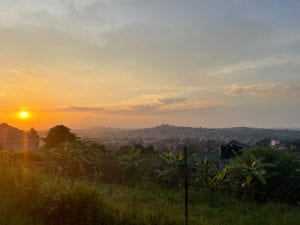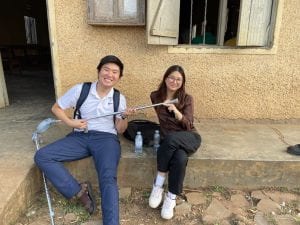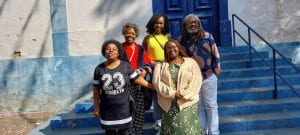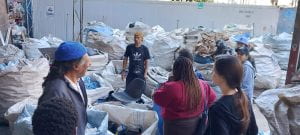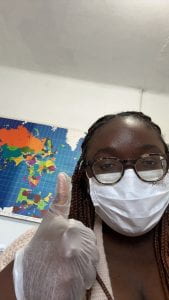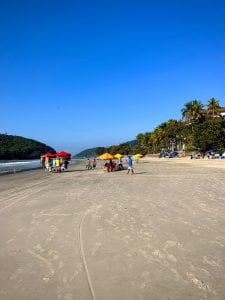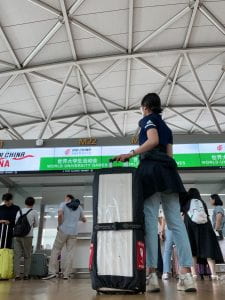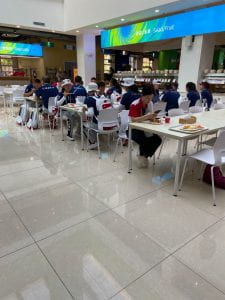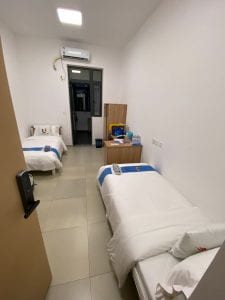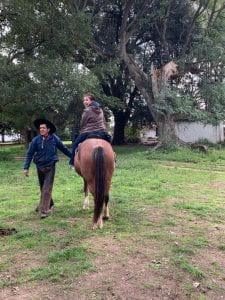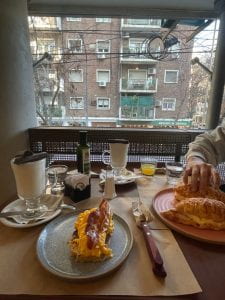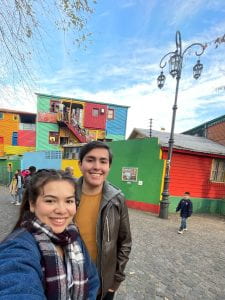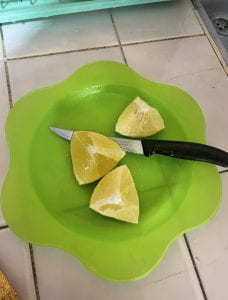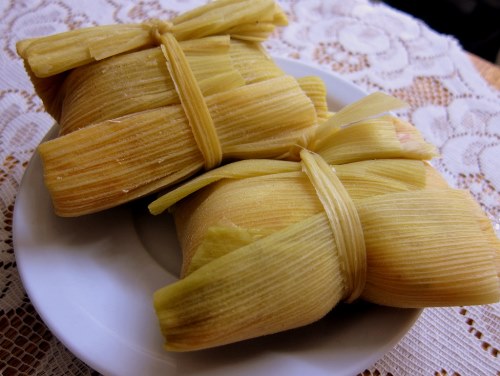Thanks to the Loewenstern Fellowship, I have had the wonderful privilege of working at El Banco de Alimentos in Cochabamba, Bolivia. Through this experience, I have gotten to know the most passionate and driven individuals who have profoundly impacted my life for the better. I have had countless meaningful experiences that have taught me so much. I have therefore decided to use my blog to share some of the lessons that I have learned here in Bolivia from some of the people who have made my time here so special and unforgettable.
Lessons on Forgiveness with Yu:
Yu was one of the first people Jackson (my travel partner) and I met at El Banco de Alimentos de Bolivia. We first entered the food bank about two months ago, yet it feels like our first day happened just yesterday…
I am not a big planner, I rarely think too far into the future. Instead, I often prefer to focus on the now. However, this meant that I did not allow myself a moment this past semester to truly think through what it would mean to live and work in Cochabamba, Bolivia. Therefore, entering the large metal gates of the food bank on the first day, all of my nerves culminated as the following questions swirled around my head:
What if everyone hates me?
What if I don’t understand Spanish well enough?
What if I mess everything up?
What if I break something?
What if I accidentally offend someone?
What if I’m not strong enough to do the work they want me to do?
I hoped that Jheysson (the food bank’s founder) could not read my thoughts.
My worries slightly calmed when a familiar face came to greet us. Jorge, a past Loewenstern Fellow and friend of mine from Rice entered the room and gave Jackson and I each a warm hug. Afterwards, we were introduced to some new faces. This is when we first met Yu (our manager at the Food Bank). Yu reached out his hand towards me, but as I shook it, he leaned in to kiss me on the cheek (the normal way to greet women in Bolivia). Already very nervous, this caught me by surprise. I jumped back, as in the US, physical touch when greeting someone is far from the norm. Yu and Jorge explained to me that this was how people greeted people in Bolivia. Embarrassed, I asked to try again. Only a few minutes into our fellowship, I had already made my first mistake. Thankfully, this second try went off without a hitch. This became a common theme during my time at El Banco de Alimentos; if at first you don’t succeed, then try, try again.
Luckily for me, I would later learn that Yu is not someone to judge or hold grudges, so I am sure that this initial interaction has most likely disappeared from his mind. Over the past month, I have come to know Yu as an incredibly caring, tranquil, and forgiving boss. I have made numerous mistakes, which Yu has always approached with a gentle calmness. I have learned a valuable lesson from him: mistakes are not the end of the world, everything has a solution.
One mistake stands out to me from the rest, as it was my most recent. I have dubbed this mistake “the water bottle incident.” The day of the water bottle incident started out like any other. Carolina (a beneficiaries manager at the food bank) asked me to load 75 packets of water bottles for a community. Yu pointed me towards a pallet of water bottles, and I began to load them on. An important thing to note here is that the food bank is incredibly organized, and Yu is in charge of maintaining this organization. Since food usually arrives at the food bank very close to its expiry date, this organization is imperative in ensuring that as soon as food comes in, it goes out. This is how the food bank is able to best maximize their widespread impact.
Prior to stacking the 75 requested bottles, I ran out of units on the pallet that Yu had pointed me towards. I wandered over to his desk, and looked over at him. Nervous to interrupt his work, I turned around to see a pallet of water bottles with the same expiry dates as the ones I had previously loaded. I made the error of deciding not to check with Yu (who knows everything about the warehouse and would have been able to point me to the correct pallet), and began to load more bottles from this pallet and deliver them to the door.
About 30 minutes later, when I had already loaded quite a few bottles from this erroneous pallet, Yu looked over and stopped me. He let me know that the bottles I was loading had not been entered into the system yet, so they could not go out to beneficiaries. I immediately stopped in my tracks. From the deer in headlights look on my face, Yu could tell that I was more than a packet or two of bottles into my mistake. “Cuántos paquetes tomaste de allá?” (How many packets did you take from there) Yu asked me.
“Umm 20” I guessed “no 12” I revised. The truth was, I had absolutely no idea. Yu could tell that I was just throwing out random numbers.
“Estas seguro?” (Are you sure) He asked me.
“No, Lo siento, I’m sorry” I admitted.
“Ok, necesitamos revisar y contar todos las botellas” (We need to check and count all the bottles) Yu said, quickly finding a way to remedy my mistake.
I spent the rest of the morning alternating between repeating “Lo Siento” and “Sorry”, hoping that if I tried both languages my apology would communicate how remorseful I truly was for my mistake. I also began to try and fix it, loading bottles onto a cart from the correct pallet to bring down to the loading door. As I dragged the new bottles down the ramp, the cart became too heavy for me and I was distracted, still preoccupied by my worries regarding the misplaced bottles, so I crashed loudly into the wall, spilling the bottles all over the floor right in front of Yu’s desk (my second mistake within a 5 minute time span).
Needless to say, I was mortified and holding back tears at this point. Hearing the loud bang, Yu looked up from his computer. I expected him to be angry, so I looked over to gauge his reaction. He was laughing. He didn’t get angry, he didn’t yell at me, he didn’t even seem upset. In fact after he was done laughing, he even came over to help me restack the bottles. “No te preocupes, esta bien Neha, tranqui, podemos arreglar” (don’t worry, it’s ok, relax, we can fix it) he said to me.
Our past experiences will always taint our future expectations. Yu’s reaction caught me off guard, as I was not used to seeing this level of calm in the face of a mistake. My past experiences working in the US have conditioned me to so often expect the worst when I make a mistake. I therefore find it hard to grant myself forgiveness for mistakes, no matter how big or small. I have never before been in an environment like the food bank, where mistakes are not only forgiven but are forgiven with such warmth and compassion.
After that day of work at the food bank, Yu took Jackson and I to see a movie, try Bolivian street food, and watch traditional dances. As we walked around the city and talked, I began to realize that Yu was not angry at me about the water bottles, he had moved on, and I should too. At the end of our movie night with Yu, for the first time since our initial meeting, I leaned in and kissed goodbye on the cheek, finally properly embracing a salutation that perfectly displays Bolivia’s culture of love, care, and understanding.
Yu’s reaction to my mistake was kind and gentle. His character is so very different from anyone I have ever met before. He has shown me that we can always choose to be empathetic, even amidst work and stress. I hope to one day embody Yu’s level of calmness and apply forgiveness the same way he does, both towards others and towards myself. Yu taught me an important lesson that I will be taking back with me to Rice: mistakes are not the end of the world, we can always find solutions.
Unlearning a lifelong and deeply ingrained fear of mistakes is no easy task, but I thank Yu for being patient with me, and for opening my eyes everyday to the possibility of a workplace without fear. I am slowly learning not to consistently expect the worst reactions to my mistakes. I realize now that I deserve the same grace that I would extend to another person. So, I forgive myself for misplacing (and spilling) the water bottles, and I forgive myself also for the countless future mistakes I will inevitably make in the next month at the food bank. Now, when I make a mistake, I can exhale knowing that I will always have help fixing it. Yu’s words continue to ring in my head as a reminder, “Todo tiene un solución, tranquí” (everything has a solution, relax).

Lessons on Feminine Strength with Laura:
Throughout my life feminism has always been an important theme. As a student involved in diversity, equity, and inclusion work, I have always believed that everyone deserves equal respect. However, in our current society, it is clear that in many circumstances the same respect that is given freely to a man must be hard earned by women. Laura is one of the hardest-working people I think I have ever encountered, and she is so respected here at the food bank. Clearly, she has worked so hard to earn this respect. Working under Laura at the food bank has changed my conception of feminine strength for the better.
I realize now that prior to working at the food bank, my conception of feminine strength was deeply flawed. To understand where my conception went wrong, I reflect on a past experience with gender-based violence that I had when I was 17 years old. After this incident, it was hard for me to ever feel truly physically strong again. For a long time, I viewed this incident as a moment of profound weakness which greatly altered my self-perception pertaining to physical strength. I realize now that I let one moment completely taint how I viewed feminine strength as a whole. Instead of embracing women’s capability for physical strength, I focused exclusively on intellectual strength after this incident. Within myself, I focused solely on strengthening my intellect as opposed to my body. After what happened, I had given up on the idea of ever truly feeling physically stronger than a man.
Witnessing Laura work at the food bank has been so transformative, both for my personal self-perception and for my perception of feminine strength as a whole. I have never met anyone who works as hard as Laura does at the food bank. When there is work to be done, Laura is there. It does not matter whether it is a holiday or a Sunday, when there is work to be done, I know that Laura will be there. Additionally, she is always unafraid to take on the most arduous tasks. I have seen Laura wake up at 5am to deliver food to vulnerable populations in Bolivia. I have also seen her fill an entire truck up with wood chips for compost with a shovel and then empty that same truck. I have seen her lift 6 cases of cookies at a time whilst most people tire after lifting 4. The work she does inspires me. She is an integral part of the food bank’s functioning, not only for her physical strength, but also for her incredible organizational skills and intelligence as well. Laura seamlessly manages relations with beneficiaries and is always on time. Additionally, my conversations with Laura have been such a delightful part of this experience, as she never fails to bring in a novel perspective.
Laura has shown me a new way to embrace feminine strength. I see now how close-minded and factually incorrect my prior conception of feminine strength was. I was afraid that I would never be able to guarantee myself physical strength, so I focused on intellectuality instead. I wanted a level of control over my future. Yet, the truth is, that we can’t ever control the situations in our future, but this does not mean that we should not strive to be the best possible versions of ourselves. My prior conception of feminine strength so clearly denied the exceptionality of so many women, women like Laura, who work day in and day out to embody a perfect combination of both physical and intellectual strength.
I won’t ever be able to 100% ensure that there are no more moments of weakness in my future, but this does not mean that I need to live in fear surrounded by sentiments of weakness. Now, at the food bank, I often look to Laura for direction; where she is, I want to be, what she is doing, I want to be doing. Thanks to Laura’s guidance, I do not feel weak anymore, instead I am getting stronger and smarter every day at the food bank. I thank Laura for opening my eyes up to a world of potential; from now on, I embrace feminine strength in a comprehensive way.

Lessons on Compassion with Pame:
My experiences with Pame have been some of the absolute highlights of my time here in Bolivia. I have learned so much from her wisdom and kindness, as well as from her unique language skills. Pame has an aura of empathy and compassion that draws people in, both beneficiaries and her co-workers. I first had the privilege of connecting with Pame on a trip to deliver cookies to vulnerable populations in more rural areas of Bolivia. This was my first time actually coming face-to-face with the food bank’s beneficiaries, and it was an incredibly impactful experience. I am so grateful to Pame and Jonah (another co-worker who drives the food bank’s trucks) for inviting me to share in these incredibly special moments.
Delivering the cookies was a wonderful experience. Learning from Pame and watching her interact with children was such a gift. Pame’s heart is as big as the sky. I watched her maintain her patience amidst chaos, gift cookies to children without the usual logistics fee, and speak to beneficiaries in their maternal language, Quechua. The truck ride there and back was also incredibly enjoyable for me, as Pame is the most wonderful conversationalist. I learned so much from her, and she asked the most interesting questions, helping me transcend the Spanish-English language barrier. Pame was one of the first people I truly opened up to here at the food bank. I feel so comfortable around her, as when Pame speaks, you can hear in her voice how much she truly cares about everyone around her. Pame now knows more about my life in Maryland than most of my friends at Rice do.
Importantly, Pame is one of the few people at the food bank who speaks Quechua (Cochabamba’s indigenous language) fluently. She is therefore absolutely integral to the food bank’s functioning, as her language ability is fundamental in building trust and confidence between the bank and the communities it serves. Listening to Pame speak Quechua with beneficiaries has been such a privilege. I have been able to witness firsthand the level of comfort and security Pame brings people. Language is an integral aspect of culture, a common language can break down barriers. Pame’s language skills build bridges between vulnerable populations and the food bank.
My experiences with Pame have helped me reflect on my knowledge of my own maternal language, Hindi, which I unfortunately lost the ability to speak as a kid. When I was younger, I did not think that it was important to dedicate myself to learning Hindi, as like many children of immigrants, I wanted to be as American as possible. I see now that this was a mistake that has cost me so much potential connection with my own culture. These past few months, people in Bolivia have asked me about my culture, my Indian roots. This has helped me embrace my background. Since being here, I have started learning a few Hindi words and listening to Hindi music, attempting to retain a little more of my language and culture. Pame has shown me how language skills can truly open the door to compassion and empathy as well as connection to culture, and for that, I am so grateful to her.
When speaking with Pame, you can tell that she truly loves the work that she is doing at the food bank. She is so knowledgeable about her community and about society as a whole. You can feel her desire to help people and her love for others. She was so kind to seamlessly extend this love to me these past few months. I hope Pame knows the impact she is making on so many people’s lives, and I hope that she knows the impact she had on mine. I now have a role model for life, and I hope to have a career just like hers’, one full of compassion and service to others. When I “grow up”, if my heart is even half the size of Pame’s, I would consider it a success.
Conclusion:
Yu, Laura, and Pame are all very different. They each have different personalities, different values, and different styles of working at the food bank. Yet, they are all a part of a team. They all offer each other mutual respect and friendship, and their strengths compliment each others’ so well. What I love about the food bank is that there is never only one right way of doing things. The food bank is a community of passionate individuals all working towards a common goal, but not everyone works towards this goal in the same way. Everyone is in the right at the food bank, no one is shamed or punished for doing things their way. This is a team, a community, that embraces differences.
At home, in the United States, learning to relax has always been a bit difficult for me. Sometimes, I feel as though I live in a world of pressure, a never-ending horse race. At Rice, I feel a need to prove myself; to prove that I deserve to be there, or to prove that I deserve a future after. I am so grateful that I was welcomed into the food bank’s community, as it is a world free from this mounting pressure. I have learned that whilst I should strive to be my strongest and most compassionate self, making mistakes is perfectly alright. I plan on taking this lesson back to Rice. Not everything has to be perfect all of the time. It is ok to feel emotions, to be nervous or afraid, but I know now that this fear does not have to control you. For right now, I am so grateful to exist within the world of the food bank; a world where mistakes are forgiven, strength in all forms is celebrated, and compassion is everywhere.






